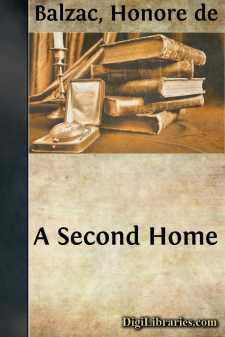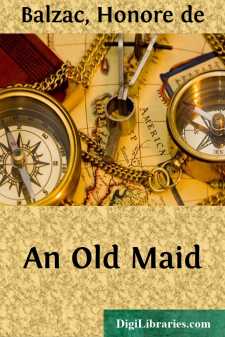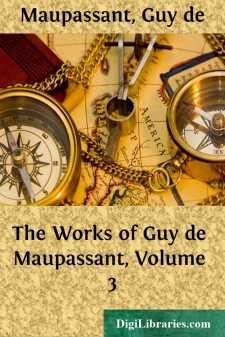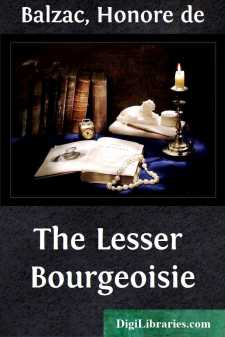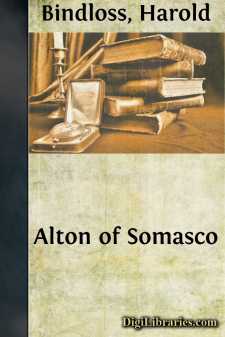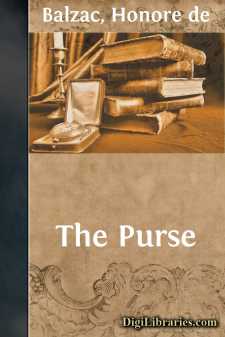Literary Collections
- American 84
- Ancient, Classical & Medieval 14
- Asian 1
- Australian & Oceanian 1
- Canadian 55
- Continental European 121
- English, Irish, Scottish, Welsh 179
- Essays 160
- General 24
- Letters 46
- Middle Eastern 1
Literary Collections Books
Sort by:
by:
Honore de Balzac
A SECOND HOME The Rue du Tourniquet-Saint-Jean, formerly one of the darkest and most tortuous of the streets about the Hotel de Ville, zigzagged round the little gardens of the Paris Prefecture, and ended at the Rue Martroi, exactly at the angle of an old wall now pulled down. Here stood the turnstile to which the street owed its name; it was not removed till 1823, when the Municipality built a...
more...
by:
Honore de Balzac
CHAPTER I. ONE OF MANY CHEVALIERS DE VALOIS Most persons have encountered, in certain provinces in France, a number of Chevaliers de Valois. One lived in Normandy, another at Bourges, a third (with whom we have here to do) flourished in Alencon, and doubtless the South possesses others. The number of the Valesian tribe is, however, of no consequence to the present tale. All these chevaliers, among whom...
more...
by:
William Carleton
CHAPTER I.—The Chapel Green of Esker Dearg. The chapel of Esker Dearg, or the Red Ridge, was situated in a rich and well-cultivated country, that for miles about it literally teemed with abundance. The Red Ridge under which it stood was one of those long eminences, almost, if not altogether, peculiar to Ireland. It was, as the name betokens, a prolonged elevation that ran for nearly a mile and a half...
more...
by:
Martin Ross
CHAPTER I "Christian, dost them see them?" sang an elder brother, small enough to be brutal, large enough to hurt, while he twisted Christian's arm as though it were indeed the rope that it so much resembled. "I won't say I saw them, because I didn't!" replied Christian, who had ceased to struggle, but was as far as ever from submission; "but if I had, you might twist...
more...
"After all," Count d'Avorsy said, stirring his tea with the slow movements of a prelate, "what truth was there in anything that was said at Court, almost without any restraint, and did the Empress, whose beauty has been ruined by some secret grief, who will no longer see anyone and who soothes her continual mental weariness by some journeys without an object and without a rest, in...
more...
by:
John Galsworthy
PREFACE Writing not long ago to my oldest literary friend, I expressed in a moment of heedless sentiment the wish that we might have again one of our talks of long-past days, over the purposes and methods of our art. And my friend, wiser than I, as he has always been, replied with this doubting phrase "Could we recapture the zest of that old time?" I would not like to believe that our faith in...
more...
by:
Honore de Balzac
CHAPTER I. DEPARTING PARIS The tourniquet Saint-Jean, the narrow passage entered through a turnstile, a description of which was said to be so wearisome in the study entitled "A Double Life" (Scenes from Private Life), that naive relic of old Paris, has at the present moment no existence except in our said typography. The building of the Hotel-de-Ville, such as we now see it, swept away a whole...
more...
by:
Harold Bindloss
CHAPTER I THE FIRST ENCOUNTER It was snowing slowly and persistently, as it had done all day, when Henry Alton of Somasco ranch stood struggling with a half-tamed Cayuse pony in a British Columbian settlement. The Cayuse had laid its ears back, and was describing a circle round him, scattering mud and snow, while the man who gripped the bridle in a lean, brown hand watched it without impatience,...
more...
by:
Honore de Balzac
THE PURSE For souls to whom effusiveness is easy there is a delicious hour that falls when it is not yet night, but is no longer day; the twilight gleam throws softened lights or tricksy reflections on every object, and favors a dreamy mood which vaguely weds itself to the play of light and shade. The silence which generally prevails at that time makes it particularly dear to artists, who grow...
more...
Chapter One. “Was she wrong?Is it wrong in the bird to escape from the snare of the fowler?Is it wrong in the hunted deer to flee to the screening thicket?” Mr Hadden was standing at the open door of the manse, waiting patiently, while his housekeeper adjusted his grey plaid on his shoulders in preparation for a...
more...


